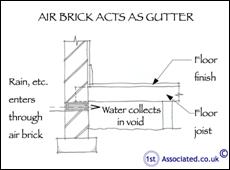We are independent building surveyors and are happy to help you when you are buying your first property. Please free phone us on 0800 298 5424 for a friendly chat. We provide all sorts of help and advice with regard to property.
Buying your first home, where do you start?
 We would recommend you start by looking at the various websites such as Rightmove.co.uk, Zoopla.co.uk, PrimeLocation.com, TheModernHouse.net, WowHaus.co.uk, Tepilo.com, PeriodProperty.co.uk etc, and we suggest that you take your time looking at properties on the Internet, the information in detail that many of the websites link to is now very good. It's also worth having a drive past the houses as well, because it's very different when you are looking at a house from a point of view of it being your future home.
We would recommend you start by looking at the various websites such as Rightmove.co.uk, Zoopla.co.uk, PrimeLocation.com, TheModernHouse.net, WowHaus.co.uk, Tepilo.com, PeriodProperty.co.uk etc, and we suggest that you take your time looking at properties on the Internet, the information in detail that many of the websites link to is now very good. It's also worth having a drive past the houses as well, because it's very different when you are looking at a house from a point of view of it being your future home.
Free phone 0800 298 5424
Visiting an estate agent
The next logical step is to visit an estate agent's office and ask them for property details, which are literally paper prints, often of what you can find on the Internet. Ask them also to view the property.
There are a few things you need to know about estate agents before you go into the office
There are a few things you need to know about estate agents before you go into the office which we have gathered here:
Estate agents work for the seller on a commission basis
We may be stating the obvious but the estate agent if working for the seller on a commission basis (sometimes known as the vendor) and not you, the buyer (sometimes known as the purchaser).
It may be the first house or home you are buying but it certainly won't be the first house the estate agent is selling so beware of selling techniques
 A house purchase is so special to the person buying it, yet from the estate agents point of view it can just be another day in a job where they have to sell houses, so don't expect a fanfare of trumpets as you walk into the estate agents saying you'd like to buy a house. The estate agent yet again has to go through the details of the house and yet again has to take someone round to view it. In fact often the estate agents won't let their best estate agent take people round to view the property as they consider this a waste of their best estate agents.
A house purchase is so special to the person buying it, yet from the estate agents point of view it can just be another day in a job where they have to sell houses, so don't expect a fanfare of trumpets as you walk into the estate agents saying you'd like to buy a house. The estate agent yet again has to go through the details of the house and yet again has to take someone round to view it. In fact often the estate agents won't let their best estate agent take people round to view the property as they consider this a waste of their best estate agents.
Estate agents, how do they work and who does what?
It is worth being pre-warned and then you know the type of estate agent you are talking to:
A Negotiator
Someone who negotiates on the sale once you've decided.
A Lister
Probably the top estate job - someone who actually gets the properties listed with the estate agents. This is a fairly difficult job as you have to do your sales pitch to the house seller and also get the price at an appropriate level to make the house seller want to sell the house with you, as of course as an estate agent unless you have houses to sell you don't have a business.
The Viewer
The bottom rung of the ladder, who shows people around the houses. This is usually the least experienced or least skilled estate agent (unless of course you are buying a multi million pound property and then you do get the best estate agent). After all, there isn't anything very hard about showing you around a property and advising you that a room with a bath in it, a shower, a WC and a wash hand basin is a bathroom!
What is the estate agent up to when they talk to you?
Most estate agents when they are showing you around a house are trying to generate interest in selling the house. They can do this in a variety of ways depending upon how the housing market is and what they think your position is. For example, if the housing market is strong the normal type of sales pitch you get from an estate agent is that they have hundreds or thousands of viewings (we may be exaggerating they may just say three) on that property that day, that weekend, that week, and it's bound to sell, are you going to make an offer? This is often known as a presumed sale pitch.
Normal sales pitch, which is where they sell on the benefits of the property. This could be location for schools, town centre, work, number of rooms, etc, but this sort of sale is normally saved for the second time purchaser or third time purchaser, but in a poor or slow market, or in a recession the estate agent may resort to selling this way.
Your special sale. Another type of sale is where the estate agents says that the property is just coming on to the market and they are giving you preferential treatment (this could mean they've tried everyone else and you're the only one left) and they are phoning you up before the details are put together or as the details are being put together.
At the end of the day, regardless of what sales pitch is made you do need to remember the estate agent if working for the house seller or vendor.
What else is the estate agent up to?

Many, many years ago we wrote an article called ‘Beautiful Naïve Thoughts'. In this we explained how as chartered surveyors we at last understood estate agents as we had bought a partnership of an estate agents. Estate agents were not just trying to sell a house, as we'd thought for many years, they were also very heavily involved and connected with mortgage companies (if not owned by mortgage companies) and they were as keen, if not keener, to sell you a mortgage.
Are estate agents selling financial services?
The vast majority of estate agents have financial advisers or financial sales people who will do their upmost to make sure you give your details of how much you earn and therefore how much you can afford to buy a house for. One of the phrases that tends to get used is that they need to qualify you, let's repeat that - “qualify you” to ensure that you are a serious buyer and are able to purchase the property. This qualifying process also gives them the opportunity to get your details and be kind enough to offer you (sell you) a better mortgage. We would go so far as to say that some estate agents will put you to the back of the list of who they show houses to if you are not having a mortgage with them. From our experience of owning an estate agents we would say this is fairly normal practice.

We have also had personal experience when we were trying to buy a property with the estate agent not being prepared to sell us a property because we weren't going to put our property on the market with them. You must be aware that estate agents have to sell houses, they also, in most cases, have to sell mortgages as well (as well as house insurance and contents insurance too), so be very aware of this when you walk into an estate agents and you say to the first person you see in the estate agents I am interested in this property and they comment ‘we're a financial adviser but we'll see if we can find you an estate agent.'
The reason financial advisers are put to the front of estate agents offices is because you will then have had an introduction, albeit ‘accidental'. Later on when the estate agent is dealing with you and you are moving towards purchasing the property they say ‘shall we qualify you', or ‘shall we check you've got the best mortgage' remember the chap you spoke to when you first came in (the financial adviser / financial salesman) and you are linked up (or should we say linked in) with them trying to sell you a mortgage.
Enjoy yourself and always have several properties you are looking at
We feel the best way to deal with estate agents is to enjoy yourself and come over as a pleasant and honest person and also make sure the estate agent is aware that you are not complete naïve to the process (quite difficult sometimes when you're a first time buyer) and that you are looking at other properties and you haven't set your heart on one property, and also assess the estate agent, is he telling the truth, the whole truth and nothing but the truth, or is he selling like a good sales person does?
The more propeties you view and the more properties you look at on the Internet the better
We would suggest that the more properties that you look at in a given area the more you get to understand the market and the more estate agents you meet the more you'll understand the complex world of house purchasing that really should be so simple.
Compare our website and compare our quality of structural surveys
Have a look around our website and compare it with other websites. We pride ourselves on our professional standard and versatile, easy to read survey reports, which we have been carrying out for many years on every age, type and style of property throughout the UK.
For further information take a look at our surveys examples and interesting property articles. For example:
Beautifully naive thoughts
Trust me I'm an estate agent
First time buyers start here
Why do people have Surveys? Caveat Emptor
Caveat Emptor means Buyer Beware. You should be aware that the onus is on you the buyer to find any faults with the prospective property you are purchasing, as the estate agent certainly won't tell you if there are any problems. To be 100% sure of the property you are buying we recommend you have a building survey (often known as a structural survey), carried out by a qualified independent surveyor who will be acting for you, and you alone, and who will be able to tell you of any potential problems with the property.
The Good, The Bad and The Ugly Survey Reports
 We would also like to tell you about our ‘good, bad and ugly' survey. This is a building survey, sometimes known as a structural survey, and is something that we have developed over many, many years. We will tell you all about the good points of the house, as well as all the potential problems we find, and also if there is something major wrong with the property, when there are major problems when we advise you seek a reduction in purchase price and (in very few cases) where we advise you against buying the property. We have listened to feedback from our clients and changed our survey reports to make them easy to read and understand.
We would also like to tell you about our ‘good, bad and ugly' survey. This is a building survey, sometimes known as a structural survey, and is something that we have developed over many, many years. We will tell you all about the good points of the house, as well as all the potential problems we find, and also if there is something major wrong with the property, when there are major problems when we advise you seek a reduction in purchase price and (in very few cases) where we advise you against buying the property. We have listened to feedback from our clients and changed our survey reports to make them easy to read and understand.
What do the red circles and ovals mean in our survey reports and articles?
The red circles / ovals are a system that we used within our survey reports to highlight problem areas so that you are not left wondering what the problem is. In addition to this if we don't believe the photographs explain the problem enough we also add in one of our own sketches such as the example that is shown here.
Independent Surveyors
If you are first time buyer and are interested in having a building survey why not call us on free phone 0800 298 5424 for a friendly chat with one of our surveyors.
We would be happy to email you several examples of our residential building survey reports or commercial property reports. As you can see from this article we use lots of sketches and photos in our reports as the feedback we have from our clients is that the sketches and photos help them understand the reports.
We trust you found the article of use and if you have any experiences that you believe should be added to this article that would benefit others, or you feel that some of the information that we have put is wrong then please do not pause to contact us (we are only human).
We hope you found the article of use and if you have any experiences that you feel should be added to this article that would benefit others, or you feel that some of the information that we have put is wrong then please do not hesitate to contact us (we are only human).
The contents of the website are for general information only and is not intended to be relied upon for specific or general decisions. Appropriate independent professional advice should be paid for before making such a decision.
All rights reserved by 1stAssociated.co.uk
All rights are reserved, the contents of the website are not to be reproduced or transmitted in any form in whole or part without the express written permission of www.1stAssociated.co.uk .
